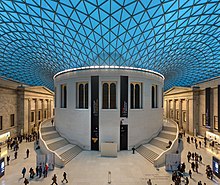Sylvester Mubayi
Sylvester Mubayi (1942 – 13 December 2022) was a Zimbabwean sculptor.[1]
Early life and education
Sylvester Mubayi was born in 1942 in the Chihota Reserve near Marondera, Zimbabwe, the sixth child in a family of nine. He left school aged sixteen and worked as a tobacco grader. In 1966 he moved to Harare (then Salisbury) and worked at the Chibuku Breweries.[2][3]
Later life and exhibitions

Mubayi joined the Tengenenge Sculpture Community in April 1967 as one of its early members.[2] In 1969, Frank McEwen, who was the founding director of the Rhodes National Gallery in Harare, opened a workshop school to encourage the development of local artists and his wife Mary (née McFadden) established Vukutu, a sculptural farm near Nyanga: Mubayi was the first sculptor to work there.[4] McEwen lauded Mubayi as the "greatest sculptor of all time"[5] and after McEwen's death his bequest of sculptures to the British Museum included six pieces by Mubayi.[6] According to Jonathan Zilbert, Mubayi at that time used skeletons as a recurring theme in his work, intending them to illustrate ancestral spirits and blood sacrifice.[5]
An exhibition of sculptures which toured South African cities in 1968–9 included a stone carving Nzuzu (Waterspirit) by Mubayi and it won an Oppenheimer Memorial Trust Award for sculpture.[2]
Mubayi was an
“Now that Henry Moore is dead, who is the greatest living stone sculptor? Were I to choose, I would choose from three Zimbabwean sculptors — Sylvester Mubayi, Nicholas Mukomberanwa and Joseph Ndandarika.”
The catalogue Chapungu: Culture and Legend – A Culture in Stone for an exhibition at Kew Gardens in 2000 depicts Mubayi's sculptures Protected by our Spirits (Springstone, 1999) on p. 34-35, Spirit Bird Prays for Rain (Springstone, 1997) on p. 90-91 and Returning to my Sekuru (Elder) (Springstone, 1997) on p. 98-99.[9] An exhibition of the same name toured in the US in 2003, with Mubayi's Traditional Healer presented at the Chicago Botanic Garden and the Garfield Park Conservatory.[10]
The National Gallery of Zimbabwe held a retrospective of his life's work in August 2008 to much acclaim. Their permanent collection includes The Skeleton Man, and Witch and Her Mate.[3]
In 2017, Mubayi represented Zimbabwe at the 57th Venice Biennale. His sculpture exhibited there included Snail Crossing the River, Spirit Buffalo and War Victim.[11]
Selected solo or group exhibitions
- 1971 Sculpture Contemporaine des Shonas d’Afrique, Musée Rodin, Paris, France[12][13]
- 1978 MOMA, New York, USA
- 1990 Contemporary Stone Carving from Zimbabwe, Yorkshire Sculpture Park, UK[14]
- 2000 Chapungu: Custom and Legend – A Culture in Stone, Kew Gardens, UK[9]
Death
Mubayi died in Chitungwiza on 13 December 2022, at the age of 80.[1][7]
See also
Further reading
- ISBN 0-908309-11-2(Cloth bound)
- Winter-Irving C. “Pieces of Time: An anthology of articles on Zimbabwe’s stone sculpture published in The Herald and Zimbabwe Mirror 1999-2000”. Mambo Press, Zimbabwe, 2004, ISBN 0-86922-781-5
References
- ^ a b "Sylvester Mubayi". guruve.com. Retrieved 15 December 2022.
- ^ a b c d In the exhibition catalogue (1997) for "Talking Stones VI"; ed. Prichard N, Eton, Berkshire (no ISBN)
- ^ a b c d Monda, Tony (18 June 2015). "The last lion of Zimbabwe stone sculpture". thepatriot.co.zw. Retrieved 15 December 2022.
- ^ a b Akuda, Timothy (3 February 2021). "Legends of sculpture still standing". The Herald. Retrieved 19 December 2022.
- ^ a b Zilberg, Johnathan (13 July 2006). "The Frank McEwen Collection of Shona Sculpture in the British Museum". National Gallery of Zimbabwe. Retrieved 15 December 2022.
- ^ "Frank McEwen's bequest to British Museum:Sylvester Mubayi". British museum. Retrieved 15 December 2022.
- ^ a b "Veteran sculptor Mubayi dies". The Herald. 15 December 2022. Retrieved 15 December 2022.
- ^ Mawdsley, Joceline (1997). "Sylvester Mubayi". postcolonialweb.org. Retrieved 19 December 2022.
- ^ a b Catalogue published by Chapungu Sculpture Park, 2000, 136pp, with photographs by Jerry Hardman-Jones and text by Roy Guthrie (no ISBN)
- ^ Vitello, Barbara (6 June 2003). "Spirit in stone Chapungu sculptors inspire a nation in turmoil". Daily Herald. Arlington Heights, Illinois. p. 36.
- ^ "Mubayi goes international". The Herald. 19 June 2017. Retrieved 18 December 2022.
- JSTOR 3334584.
- JSTOR 3334571.
- ISBN 1871480043.
